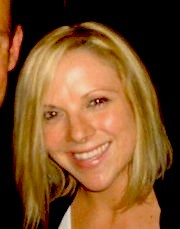Natasha Dillon thinks she’s boring — but that’s not really the case at all.
Earlier this month, Borough President Scott Stringer announced the newly appointed selections to Community Board 3, which covers the East Village, Lower East Side and parts of Chinatown. Ms. Dillon, a 26-year-old East Villager and gay rights activist, was one of these new appointees, after previously serving on the board as a community member. And while some insist that this crop of new appointees seems rather eclectic, Ms. Dillon insists that she’s actually quite boring.
As a financial consultant, who’s currently working on a master’s degree in investment management from Pace University, Ms. Dillon seems like the average young East Village resident, except this activist and founder of a local East Village advocacy group, Queer Rising, has been arrested four times in the last year for her public actions for marriage equality in the United States. Her most recent arrest came earlier this month, after a group of Queer Rising members blocked traffic near Governor Andrew Cuomo’s Manhattan office on Third Avenue for nearly 10 minutes.
However, Ms. Dillon has a somewhat different, slightly less radical, agenda for the East Village. Serving on the economic development committee, her main concern is to bring life back to local businesses — and to the East Village.
Ms. Dillon talks to The Local about her plans for Community Board 3 and what she hopes to see change in our neighborhood.
How did you become interested in Community Board meetings and local involvement?
I actually began going to community board meetings because I had been so active in other area’s in the city, like Queens and the Bronx and Brooklyn to speak to people and educate people in the community boards in those areas about LGBT issues, specifically marriage equality. So I figured, why don’t I go to my own community board? There are issues in my own neighborhood, and I wanted to participate.
What’s your role in the Community Board?
I’m now a board member. I’ve been a public member for about a year, doing economic development. The reason I moved to the East Village was because it was so quaint and cute, and it had so many store-fronts and small businesses, but over the years, as we’ve all noticed, a lot of them have shut down because of the economy. This is a way to be creative and to think of ways to bring all of the small business back to the East Village. So I’ve spent the last year on that committee and trying to understand why this happens and the policies behind it. I’m also in the nightlife committee, mainly because I’m young — not the typical “party-every-night-young” — but I think being active in that committee makes the older community members understand the younger residents more. It’s all about being creative and finding a happy medium between the two.
As an LGBT activist, do you feel like the gay community in the East Village needs a voice within the community board?
I know the LGBT community is angry at CB3, mainly because the bars get shut down. I think the community feels like we’re getting kicked out of our home. Other areas are more open the lifestyle. There were lesbian bars that were open in the East Village, and both were shutdown by the community board. There’s a lot of anger from the lesbian community not only toward CB3 but also toward the neighborhood. I don’t want to move out of my home, but I tend to spend most of my time on the west side when I do go out. There was this feel in the East Village that I think needs to come back.
How do you think that change within the community can happen?
Well, I don’t know yet. Who knows? Maybe there is no answer, but I think I’m optimistic enough to believe there is one. It’s a community, right? So if you want to be apart of the community, you need to participate in the community. So if these young people want to come, they can’t just come during the public session for the three minutes that they’re allotted. They have to be apart of the community and participate. I think a lot of young people get discouraged and think, it’s all old people that don’t understand nightlife. There just needs to be better communication. It’s become so black-and-white, yes-or-no, and it just can’t be. I live on East 12th Street, and there’s this cafe that wants to serve wine with brunch, and they can’t because they’re not allowed to, and that’s silly to me.
How do you think the East Village community — young and old — can see eye-to-eye?
The ones who come to the community board meeting are the ones that are really passionate about something, and it’s all about putting that passion into an action. If you really care about something, then you should get organized and do something about it. It’s about engaging each other and coming to a compromise. If there’s a person fighting for one bar, and another person standing up for another bar, then they need to organize themselves into a larger action. I’d hate to keep talking about bars because there’s so much more to the East Village than bars, but that’s the problem. That’s all anyone can talk about. Nothing else gets talked about as being an issue, like the economic issues. All they do is just fight about the bars. We all need to start compromising on these bar issues, so that we can focus on the bigger issues. That’s part of the reason the East Village is losing its charm.




